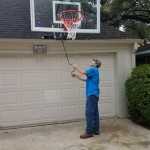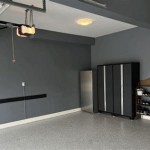Why Will My Garage Door Open But Not Close With Remote?
A common predicament for homeowners is a garage door that readily opens with the remote but refuses to close. This frustrating situation can stem from a variety of causes, ranging from simple fixes to more complex mechanical issues. Understanding the potential reasons why this malfunction occurs is crucial for troubleshooting and resolving the problem efficiently. Addressing the issue promptly is important for security purposes and to prevent further damage to the garage door system.
Diagnosing the precise cause requires a systematic approach. One must meticulously examine the remote control, the garage door opener unit, the safety sensors, and the door's mechanical components. By carefully evaluating each of these elements, one can narrow down the potential sources of the problem and implement the appropriate corrective measures. This article will explore several potential causes and offer guidance on how to troubleshoot and address each scenario.
Remote Control Issues
The remote control is the primary interface for operating the garage door, and its malfunction can manifest in various ways. A common issue is weak or depleted batteries. Over time, the batteries within the remote control can lose their charge, weakening the signal and rendering the remote ineffective, particularly for closing the door. Replacing the batteries with fresh ones is the first step in troubleshooting any remote-related problem. Ensure that the batteries are correctly oriented within the remote control casing.
Another potential issue lies in the remote's programming. The remote control may have become deprogrammed or lost its connection with the garage door opener unit. This can happen due to power surges, battery replacement, or accidental reprogramming. Refer to the garage door opener's user manual for instructions on how to reprogram the remote control. The programming process typically involves pressing a "learn" button on the opener unit and then pressing a button on the remote control.
Interference from other electronic devices can also disrupt the remote control's signal. Devices operating on similar radio frequencies, such as wireless routers, baby monitors, or certain lighting systems, can interfere with the remote's ability to communicate with the garage door opener. Try temporarily turning off any nearby electronic devices to see if this resolves the issue. If interference is the culprit, consider relocating the offending device or using a remote control with a different frequency.
Furthermore, the remote control itself may be faulty. Internal components within the remote can fail due to wear and tear, damage, or manufacturing defects. If you have multiple remote controls, test each one to see if the issue is specific to a particular remote. If only one remote is malfunctioning, it may need to be repaired or replaced. Consider purchasing a new remote control that is compatible with your garage door opener model.
Safety Sensor Problems
Garage door openers are equipped with safety sensors, typically located near the bottom of the door tracks. These sensors are crucial for preventing the door from closing if an obstruction is detected in its path. If the sensors are misaligned, obstructed, or malfunctioning, the garage door opener will prevent the door from closing. This is a critical safety feature designed to protect people and property.
The alignment of the safety sensors is paramount for their proper function. The sensors must be precisely aligned so that the infrared beam emitted by one sensor is correctly received by the other. Misalignment can occur due to bumps, vibrations, or accidental adjustments. Visually inspect the sensors to ensure they are properly aligned. If necessary, gently adjust the sensors until they are pointing directly at each other. A common indicator of proper alignment is a solid, uninterrupted light emitted from both sensors.
Obstructions in the path of the sensors can also prevent the door from closing. Even small objects, such as leaves, debris, or cobwebs, can block the infrared beam. Carefully examine the area between the sensors and remove any obstructions. Wipe the sensor lenses with a clean, dry cloth to ensure they are free of dirt and grime. Accumulation of debris can significantly impair their ability to function effectively.
The sensors themselves can also malfunction. Internal components within the sensors can fail, rendering them unable to detect obstructions or communicate properly with the garage door opener. Inspect the sensor wiring for any signs of damage, such as cuts, frays, or loose connections. Check the wiring connections at the back of the sensors and at the garage door opener unit. If the wiring is damaged, it may need to be repaired or replaced. In some cases, the sensors themselves may need to be replaced entirely.
To further diagnose sensor issues, observe the indicator lights on the sensors themselves. Typically, one sensor will emit a steady light, while the other sensor will emit a light that is either steady or changes when the beam is properly aligned. If either sensor's light is blinking or off, it indicates a problem with the sensor's alignment, wiring, or internal components. Consult the garage door opener's user manual for specific information on the meaning of the sensor indicator lights.
Garage Door Opener Unit Issues
The garage door opener unit is the central control mechanism for the entire system. Problems within the opener unit itself can lead to a variety of malfunctions, including the inability to close the door with the remote. These problems can range from simple wiring issues to more complex internal component failures. A thorough inspection of the opener unit is essential for identifying and resolving these issues.
Wiring issues within the opener unit are a common source of problems. Loose or damaged wiring can disrupt the flow of electricity and prevent the unit from functioning properly. Carefully examine the wiring connections within the opener unit, ensuring that all wires are securely connected to their respective terminals. Look for any signs of damage, such as frayed wires, corroded terminals, or loose connections. Tighten any loose connections and replace any damaged wiring.
The limit switches within the opener unit control the distance the door travels when opening and closing. If the limit switches are improperly adjusted, the door may not close completely or may reverse direction prematurely. Refer to the garage door opener's user manual for instructions on how to adjust the limit switches. Carefully adjust the switches, making small adjustments at a time, until the door closes fully and smoothly.
The motor within the opener unit may also be malfunctioning. The motor is responsible for providing the power to open and close the door. If the motor is weak or failing, it may be able to open the door but lack the power to close it. Listen for unusual noises coming from the motor, such as grinding, whirring, or clicking. If the motor is making unusual noises, it may need to be repaired or replaced. A qualified technician should handle motor repairs or replacements.
The circuit board within the opener unit controls all of the unit's functions. If the circuit board is damaged or malfunctioning, it can cause a wide range of problems, including the inability to close the door with the remote. Inspect the circuit board for any signs of damage, such as burned components, cracked traces, or loose connections. If the circuit board is damaged, it may need to be replaced by a qualified technician.
Power surges can also damage the garage door opener unit. Consider installing a surge protector to protect the unit from power surges. A surge protector can help to prevent damage to the unit's internal components and extend its lifespan. Regularly check the surge protector to ensure it is functioning properly.
In addition to the above, the wall-mounted button could be malfunctioning. Though the remote refuses to close it, testing the wall-mounted button if functional can help isolate the issue. If the wall-mounted button is working, most likely than not the issue lies with the remote.

Garage Door Won T Open All The Way 10 Reasons Why

Garage Door Remote Not Working 5 Most Common Reasons Why

How To Troubleshoot A Garage Door The Home Depot

If Your Garage Door Won T Open All The Way Here S How To Fix It

5 Reasons Your Garage Door Won T Close And What To Do Waypoint Inspection

5 Ways To Fix A Garage Remote That S Not Working Mesa Doors
Garage Door Won T Close Top Solutions In 2024

Why Is My Garage Door Remote Not Working Uplift

How To Fix A Garage Door That Won T Open

How To Fix A Garage Door When It Won T Close
Related Posts








